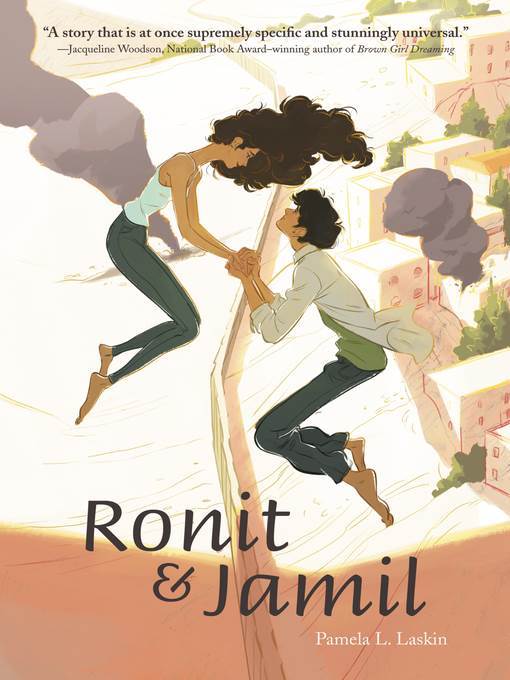
Ronit & Jamil
فرمت کتاب
ebook
تاریخ انتشار
2017
Lexile Score
1090
Reading Level
7-9
نویسنده
Pamela L. Laskinشابک
9780062458551
کتاب های مرتبط
- اطلاعات
- نقد و بررسی
- دیدگاه کاربران
نقد و بررسی

November 28, 2016
Laskin (Homer the Little Stray Cat)
creates a resonant contemporary version
of Romeo and Juliet, transporting Shakespeare’s star-crossed lovers to modern-day Gaza. Ronit, a Jewish Israeli teen, meets Jamil, a Muslim Palestinian, through their fathers, a pharmacist and doctor. Though both families work together to help the needy in Palestine, they don’t fully trust the other and are particularly wary of their teenage children talking to each other, much less falling in love. Writing in clipped, understated verse, Laskin borrows lines from the original play as she sensitively describes two lovers weaving their way through social, political, and familial hurdles designed to keep them apart (“I hate the parting/ the sorrow of it/ the fear/ tomorrow will never come”). Laskin takes pains to address the similarities between the Palestinian and Israeli households—two back-to-back poems titled “Dinner Chatter” reveal parallel menus (“Ommi’s good food:/ hummus, falafel, baba ghanoush.... Imah’s good food:/ hummus, falafel, baba ghanoush”) and attitudes—starkly juxtaposing them against mutual prejudices. A lyrical message of peace and love radiates from this relevant and hopeful reimagining. Ages 13–up. Agent: Myrsini Stephanides, Carol Mann Agency.

November 15, 2016
A timeless tale of star-crossed love set amid modern-day conflict.Laskin's novel in verse takes forbidden teen love a la Romeo and Juliet and sets it in present-day Israel. She portrays the Montagues and Capulets as Jews and Arabs, casting Ronit as the daring daughter of an Israeli pharmacist who falls for Jamil, the alluring son of a Palestinian doctor. What gives this contemporary reprise its ironic edge is that while the protagonists' fathers work together and routinely set aside political differences in the service of healing the sick, their ingrained cultural prejudices prevent them from accepting that their beloved children have fallen for each other. Laskin is at pains to show how similar the teens are: they've been raised on the same foods--"hummus, falafel, baba ghanoush"--and both wish to buck convention, Ronit to duck her mandatory army service, Jamil to avoid following in his father's footsteps to a career in medicine. Throughout, Laskin's spare first-person poems and prefatory and end notes help educate young readers as to the gravity of the political stakes in this war-torn region where, while Ronit texts that "there is no separation barrier" between them, they both lament that their physical reality proves quite the opposite: "This wall / is so high; / 25 feet of concrete / 435 miles long." At once romantic and revealing, an important window into contemporary conditions in the Middle East. (Verse fiction. 14-18)
COPYRIGHT(2016) Kirkus Reviews, ALL RIGHTS RESERVED.

January 1, 2017
Gr 7 Up-Poet Laskin's short, lyrical novel in verse is a retelling of Romeo and Juliet set in present-day Jerusalem. Ronit is an Israeli girl whose father, Chaim, is a pharmacist, and Jamil is a Palestinian boy whose father, Mohammed, is a physician. Chaim supplies prescription medications to Mohammed's patients. The two teens first meet at the clinic where both their fathers work, and, as in Shakespeare's original, the young lovers fall for each other after meeting only briefly. Through secret texts and clandestine meetings, they desperately try to be with each other while facing opposition from their parents and the very real physical barrier between Israel and the West Bank. The story departs from the original, though, with the implication that Ronit and Jamil will escape the conflict and find a way to be together-an underlying message of hope for the larger Israeli/Palestinian conflict. Laskin frequently quotes Shakespeare's play as well as Arab poets, including Rumi and Mahmoud Darwish, and makes skillful use of Middle Eastern poetic forms, such as the ghazal. It may occasionally be difficult for readers to tell which character is speaking, but the accessible verse and universal questions about crossing cultural lines make for a quick and powerful read. VERDICT An obvious choice to pair with Romeo and Juliet in a literature class, this can also open discussion about the Israeli/Palestinian conflict and about bridging cultural boundaries.-Kathleen E. Gruver, Burlington County Library, Westampton, NJ
Copyright 2017 School Library Journal, LLC Used with permission.

December 15, 2016
Grades 9-12 Israeli-born Ronit's abba works as a pharmacist in East Jerusalem; Palestinian Jamil's abi works as a doctor. But when both fathers decide to drag their willful teens onto the job with them, they impart the same stern words of advice: Don't look. Yet in this modern day Romeo and Juliet revamp, Ronit is quick to admire Jamil's hazel gaze, and Jamil, too, swiftly swoons for the girl / with the song in her voice. So begin text message trysts, marketplace meetups, and a love as fierce as it is forbidden. Like its predecessor, Laskin's tale, a series of mostly page-length poems, unfolds in five acts. Alternating between the perspectives of each teen (and, eventually, their fathers), it illuminates a tense but textured land riddled with rockets, roadblocks, and olive trees. Occasionally saccharine but always accessible, the modern verseflecked with Arabic, Hebrew, and iconic excerpts from the play itselfwill ease romance-hungry teens into both Shakespeare's original and the challenging context of the Israeli-Palestinian conflict. A welcome nod to hope in the face of the impossible.(Reprinted with permission of Booklist, copyright 2016, American Library Association.)

























دیدگاه کاربران